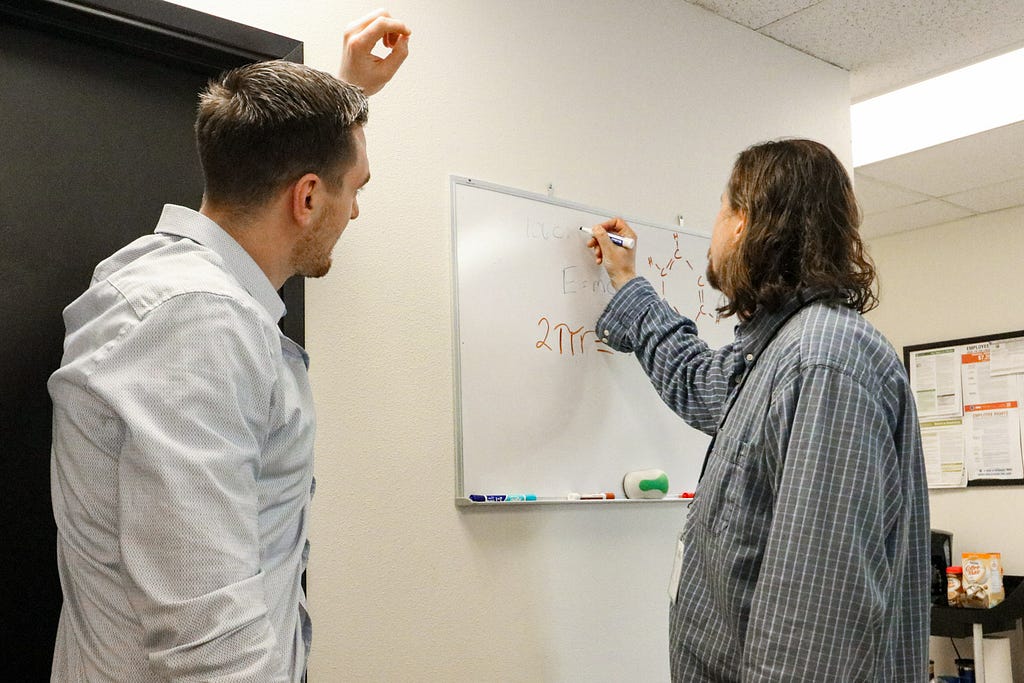5 Things I Wish I Knew Before I Started: “We aren’t getting bank loans anytime soon, but many vendors like merchant processing, payroll, and HR companies aren’t willing to work with cannabis companies either.” with Jay Burns and Fotis Georgiadis

Cannabis businesses aren’t getting bank loans anytime soon, but many vendors like merchant processing, payroll, and HR companies aren’t willing to work with cannabis companies either. We’ve encountered this a few different ways. For example, toxic waste disposal companies don’t accept cannabis waste. Security companies did not initially work with cannabis companies, but many have since changed their policies. Sometimes, banks will just close your accounts out of nowhere. We’ve had scientific equipment vendors unwilling to work with us. And even though the industry is growing really fast, these setbacks can be really frustrating.
I had the pleasure of interviewing Jay Burns. Jay is the Lab Director at Treeline Analytics, a WSLCB accredited laboratory committed to standardizing the cannabis industry through high quality and ethical testing methods. With a Ph.D. in marine, estuarine and environmental science and a background in science, policy, education and private industry, Jay focuses on protocol development and validation, quality assurance testing and regulatory compliance, as well as analysis of policy and legal frameworks for the cannabis industry.
Can you share the ‘backstory” about what brought you to the cannabis space?
I’ve been interested in the cannabis industry since about 2012, when the legal markets were first being proposed and passed by states. I saw it as a great opportunity to apply my background in science, policy, education and private industry, and that was really exciting to me. I started working with a start-up that was developing energy efficient grow lights targeted at cannabis. Then I moved to consulting with actual producers before I realized that working in the laboratory best fit my training and skillset. Since my actual cannabis experience was still pretty limited, I worked as an extraction chemist for two years to get more hands-on experience in a cannabis testing lab. I learned a lot about how crops are grown, how products are made and how producers and processors operate. It also gave me an understanding of the regulatory framework, how it’s actually implemented and how it effects the industry on a day to day basis.
Can you share the most interesting story that has happened to you since you began leading your company?
A customer once brought in some “space weed” which was an unknown plant growing in the pot of his cannabis plant. Convinced it was also cannabis, he brought in a sample for us to perform a cannabinoid profile. We were skeptical as the sample did not look like any cannabis we’d ever seen in the lab before. And while we’re still not exactly sure what it was, our tests confirmed it definitely was not cannabis.
Can you share a story about the funniest mistake you made when you were first starting? Can you tell us what lesson you learned from that?
Very early on, we were making deliveries to our customers and one of our drivers was pulled over for speeding. He got out of the car to show the cop his license to carry cannabis, but the cop just looked at him like he had two heads, handed the license back and let us go with a massive amount of cannabis in the trunk. And while it was completely legal, it was a little hairy for a minute — so lesson learned, don’t speed while driving around for the business.
Are you working on any exciting projects now?
We’re working on understanding cannabis as a matrix. The cannabis plant is very interesting on a biological, genetic and biochemical level. It’s a very difficult matrix to analyze and many factors that are known about other regulated products are missing, or under-researched in cannabis. We’re using our resources to help define some of these critical factors to help advance testing and basic research.
None of us are able to achieve success without some help along the way. Is there a particular person who you are grateful towards who helped get you to where you are? Can you share a story?
I’ve been fortunate to know many people throughout my life — family, teachers, bosses — who have been great examples of what it means to be a good person, a stand-up citizen and a respected scientist. When I think about who inspired me to pursue this career, one person stands out in my mind and I often think about him.
Mel Moon was the Director of Natural Resources at the Quileute Indian Tribe. Mel was an amazing person that had a deep understanding of people and policy. He was an excellent mentor who taught me how policy works and how it can affect people in their everyday lives. He had an uncanny ability to interpret policy and direct scientific investigations, and he always stuck to his core values. I aspire to be as wise and empathetic.
This industry is young, dynamic and creative. Do you use any clever and innovative marketing strategies that large legacy companies should consider adopting?
We are extremely limited by regulations on what advertising we can do. Direct marketing is slightly different. All cannabis companies are public record, and the state has a spreadsheet of every potential client in the state, so we advertised to this list through direct marketing. Phone calls, knocking on doors and emails. A hand-signed letter had an 11 percent response rate on our initial push. Social media presence and marketing is very important based on consumer demographics. Depending on what state, companies are bound by regulation to market to consumers. This has driven much of the advertising to social media. Companies can be less PC than traditional industries which makes the content a little more fun.

Can you share 3 things that most excite you about the cannabis industry? Can you share 3 things that most concern you?
What excites me about the industry:
· The newness of the industry — having the opportunity to shape how it develops.
· The sense of fairness and justice that’s brought to the legal system as legalization expands.
· The potential for growth as legalization increases and research and innovation continue to shape the industry.
What concerns me about the industry:
· Uncertainty of federal regulations, which inhibits investment, innovation and research.
· The differences in regulations that vary by state and a lack of dialogue to learn from mistakes and successes.
· The lack of standardization of testing methods across labs and states, which makes it difficult to compare data and can lead to misunderstandings about what test results mean by the public and by research scientists.
· The volatility of prices makes it difficult for small operations to be successful and may lead to increased consolidation and ownership by large corporations. Which is unfortunate because cannabis could be a great area for entrepreneurship and family owned businesses.
Can you share a story or example for each of your “5 Things I Wish Someone Told Me Before I Started Leading a Cannabis Business” answers?
Restrictive and frequently changing regulations makes it difficult to operate as a normal business. We can receive notice anytime about new rules and changing laws.
· Due to a lack of history to rely on, regulations were initially established on “best guesses” of how things would function and previous laws, with a big emphasis on regulating product to make sure there was no illegal transit out of state, etc. And even though the laws protecting public health are based on other regulated products, they may not be truly comparable. As the industry grows and information is gained, rules often change. Some are minor, but many can lead to financial difficulties for companies, especially processors who are required to make packaging changes (getting rid of names, colors, flavors attractive to children, etc.).
Cannabis businesses aren’t getting bank loans anytime soon, but many vendors like merchant processing, payroll, and HR companies aren’t willing to work with cannabis companies either.
· We’ve encountered this a few different ways. For example, toxic waste disposal companies don’t accept cannabis waste. Security companies did not initially work with cannabis companies, but many have since changed their policies. Sometimes, banks will just close your accounts out of nowhere. We’ve had scientific equipment vendors unwilling to work with us. And even though the industry is growing really fast, these setbacks can be really frustrating.
In a race to the bottom, competition is cutthroat — many companies are operating at break even or at a loss in order to gain market share.
· This is true for producers more than anyone. Retailers and budtenders hold the power in the industry, especially in Washington, based on vertical integration regulations and current market conditions. And to add to the confusion, neighbors and competitors are filing complaints against one another.
Buzz around the cannabis industry has helped with recruiting, but high-paying jobs, advancement opportunities and employers who can afford to offer benefits are hard to come by — making it hard to retain employees.
· With the race to the bottom, margins are not as established as in traditional industries. The companies themselves are still in their infancy and often don’t have cash reserves or cash flow to support employee benefits programs. So, companies get creative with their offers and schedule flexibility in order to accommodate talent.
Hemp and cannabis are commodities, but they’re not priced accordingly. Many new businesses build higher prices into their model, but as the industry becomes more mature, prices will fall and create problems for these businesses.
· We’ve seen several businesses forced to file for bankruptcy in order to ask for forgiveness for loans they’re unable to pay.

What advice would you give to other CEOs or founders to help their employees thrive?
One of the most important things is to make sure your employees feel involved in the company everyday. Actively seek out their opinions and ideas, because they know certain aspects of your business much better than you ever could. You never know where a great idea will come from, so listen! Along with that, reward them for their contributions and make sure they’re fairly compensated. When you have good employees, do what you need to do to keep them.
If you could inspire a movement that would bring the most amount of good to the most amount of people, what would that be?
I’ve been inspired by and part of the environmental movement for a long time, devoting most of my career to it. For me, pollution and climate change are issues that are actively affecting every person on this planet. It’s the great equalizer. We can’t wait for actions by governments, but we must take steps in our daily lives with our choices and actions.
These issues are already relevant to the cannabis industry. The current cannabis production process utilizes a lot of resources — energy, water, nutrients — which leads to resource depletion, CO2 emissions and strain on wastewater treatment. Some farms do strive to be organic and have a low impact, but this is far from the dominant practice. Cannabis is a very versatile plant that can grow under extreme conditions, but the consumer market demands high potency and high-quality flower, especially in appearance. If I could take one small step toward helping the environment in my current role, it would be to inspire growers to develop and follow best practices to minimize the impact of their crops, but still put a high-quality product out into the market. This would help inspire consumers to make that a higher priority over THC content.
Thank you for joining us!
5 Things I Wish I Knew Before I Started: “We aren’t getting bank loans anytime soon, but many… was originally published in Authority Magazine on Medium, where people are continuing the conversation by highlighting and responding to this story.



